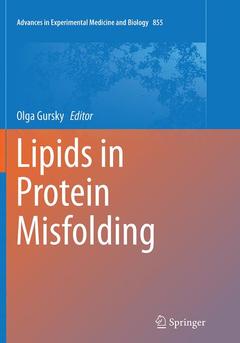Description
Lipids in Protein Misfolding, 1st ed. 2015
Advances in Experimental Medicine and Biology Series, Vol. 855
Coordinator: Gursky Olga
Language: English
Subjects for Lipids in Protein Misfolding:
Publication date: 10-2016
Support: Print on demand
Publication date: 07-2015
260 p. · 17.8x25.4 cm · Hardback
Description
/li>Contents
/li>Comment
/li>
Role of Lipids in Folding, Misfolding and Function of Integral Membrane Proteins.- Protein Misfolding in Lipid-Mimetic Environments.- Lipids in Amyloid-β Processing, Aggregation, and Toxicity.- Role of Cholesterol and Phospholipids in Amylin Misfolding, Aggregation and Etiology of Islet Amyloidosis.- Stability, Oligomerization, and Amyloidogenicity of Apo Serum Amyloid A.- Interactions of Lipid Membranes with Fibrillar Protein Aggregates.- The Role of Lipid in Misfolding and Amyloid Fibril Formation by Apolipoprotein C-II.- Amyloid-Forming Properties of Human Apolipoproteins: Sequence Analyses and Structural Insights.- Computational Approaches to Identification of Aggregation Sites and the Mechanism of Amyloid Growth.- Role of Syndecans in Lipid Metabolism and Human Diseases.
These books may interest you

Protein Misfolding 143.27 €



